|
|
|
Sort Order |
|
|
|
Items / Page
|
|
|
|
|
|
|
| Srl | Item |
| 1 |
ID:
117436


|
|
|
|
|
| Publication |
2012.
|
| Summary/Abstract |
The paper investigates the promise of Carl Schmitt's concept of 'nomos' for developing new spatial imaginaries apposite to the study of 'the border' in contemporary political life, as per the aims of the 'Lines in the Sand' research agenda. Schmitt introduced the idea of a 'nomos of the earth' to refer to the fundamental relation between space and political order. There have been various historical expressions of the nomos, from the Respublica Christiana, to the jus publicum Europaeum, to a post-World War II (dis)order yet to be adequately theorised. We aim to explore the relatively overlooked spatial ontology of Schmitt's work and suggest ways in which it might prompt alternative ways of thinking about borders and bordering practices as representative of broader dynamics in the relation between space and political order.
|
|
|
|
|
|
|
|
|
|
|
|
|
|
|
|
| 2 |
ID:
117439
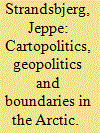

|
|
|
|
|
| Publication |
2012.
|
| Summary/Abstract |
Critical Border Studies emphasise how distinct political spaces are produced by borders. In this article I suggest that the order of this relationship should be reversed. I argue that space precedes and conditions the manifestation of borders. The argument is based on an understanding of cartography as a practice that mediates the relationship between space and borders. Drawing on Bruno Latour, I introduce the notion of cartopolitics to describe the process where questions pertaining to sovereign control over space are decided through cartography and law. In analysing current border practices in the Arctic, the term cartopolitics captures how the relationship between the United Nations Convention on the Law of the Sea and cartography is shaping the attempts by Arctic states to expand sovereign rights into the sea. The key is the continental shelf and how it is defined in law. In this process cartographic practices work to establish a particular spatial reality that subsequently serve as a basis for border making.
|
|
|
|
|
|
|
|
|
|
|
|
|
|
|
|
| 3 |
ID:
117443
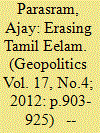

|
|
|
|
|
| Publication |
2012.
|
| Summary/Abstract |
This paper considers the Sri Lanka/Tamil Eelam conflict with attention to how its dramatic end can be explained through postcolonial territorial politics. I argue discourses of postcolonial nationalism and global terrorism aligned along domestic, regional, and international political levels to enable a military victory for the government of Sri Lanka. At the domestic political level, there was a change in government along with a split and defection within the LTTE command. At the international level, there was a turn away from Western allies due to their perceived inability to understand the needs of the Asian front in the global war on terror (GWOT). This led to a geopolitical realignment with China, a state sympathetic to fighting terrorism and secession movements. The case is studied under a theoretical lens of "de/re territorialisation" from Gilles Deleuze and Felix Guattari. De/re territorialisation reveals simultaneous efforts to inscribe nationalist meaning into territory in a constant process of "becoming."
|
|
|
|
|
|
|
|
|
|
|
|
|
|
|
|
| 4 |
ID:
117441
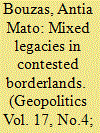

|
|
|
|
|
| Publication |
2012.
|
| Summary/Abstract |
The article explores the sense of belonging of people from Skardu, a border town located in the Gilgit-Baltistan region, a territory administered by Pakistan but which is disputed by India for its being part of the former Princely State of Jammu and Kashmir. Neither full Pakistani citizens, nor identifying themselves with Kashmiri nationalism, the people of Gilgit-Baltistan lack of a common sense of belonging. The uncertain future of the territorial entity contributes to this, despite transformations already at work there. By examining the social and material landscape of Skardu town, and therefore using a micro-level perspective, the article aims to address issues of identity and security connected with broader constructed narratives of intrastate or interstate conflict, such as the Kashmir dispute within the wider geopolitical imaginary of India-Pakistan rivalry.
|
|
|
|
|
|
|
|
|
|
|
|
|
|
|
|
| 5 |
ID:
117440


|
|
|
|
|
| Publication |
2012.
|
| Summary/Abstract |
The article examines some of the novel ways in which the European Union carries out its 'border-work'- border-work that stretches far beyond the external borders of the current Union. It highlights, in particular, the role of EUrope's neighbours in new strategies of securitisation, drawing attention to some of the actors, sites and mechanisms that make the Union's border-work possible. The emphasis in the paper is on the Mediterranean, long the premier laboratory for creative solutions to the policing of EU borders. The discussion focuses predominantly on a difficult neighbour turned 'friend' - Libya - and its role in the EUropean archipelago of border-work.
|
|
|
|
|
|
|
|
|
|
|
|
|
|
|
|
| 6 |
ID:
117445
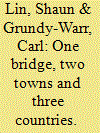

|
|
|
|
|
| Publication |
2012.
|
| Summary/Abstract |
The proposed bridge between Chiang Khong and Houay Xay will form the remaining crucial link of the Asian Highway 3, connecting Bangkok to Kunming, a project highly anticipated in the Greater Mekong Subregion's (GMS) development. With China funding half the cost of the bridge, it signifies a strong player in the economic borderland. The article seeks to uncover the locals' thoughts and feelings of the bridge to raise awareness of 'voices' from the Thai-Lao border in relation to the further destinations the bridge will serve. The local perceptions of the proposed bridge are used to provide a form of comprehension of anticipatory cross-border geopolitical relations between the Thai-Lao border and China. Drawing on the concepts of critical geopolitics, anti-geopolitics and geoeconomics, it concludes by underscoring the need to listen to local perceptions at the Thai-Lao border as they signal potential ill-feelings that could jeopardise future cross-border geopolitical ties and trade.
|
|
|
|
|
|
|
|
|
|
|
|
|
|
|
|
| 7 |
ID:
117437
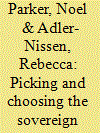

|
|
|
|
|
| Publication |
2012.
|
| Summary/Abstract |
We argue that the continued persistence of borders is an effect of their constitutive role for the many dimensions of a social particular. States cannot choose to have a border; but they can and do make choices amongst the materials available on the various planes of inscription for bordering. For contemporary states the planes have become increasingly disaggregated, in the sense that they do not fall into place at one and the same border. Thus, states have to pick and choose different articulations (often inconsistently) on different planes. We illustrate these ideas with instances, present-day and historical, of bordering. A corollary of there being more need to pick and choose is that articulations of sovereignty change. So, sovereignty is increasingly the material of 'sovereignty games', where sovereignty is used as a political instrument. In sum, our theory directs attention to state bordering on different planes of inscription.
|
|
|
|
|
|
|
|
|
|
|
|
|
|
|
|
| 8 |
ID:
117438


|
|
|
|
|
| Publication |
2012.
|
| Summary/Abstract |
It is almost a truism to say that people increasingly dwell in a transnational context, that is, in-between societal systems and together with multiple nationalities. Increasingly, people are living in a different nation in which they were born. The nation-states people dwell in cannot be equated with territorial container-boxes anymore, if this ever could. The uniform and straight lines in the sand, that borders once were thought to be, are now better understood as a complex choreography of border lines in multiplied lived spaces. This article zooms in on a specific kind of dwelling with multiple borders. It tries to get a conceptual hold of contemporary dwelling places of short-distance migrants across a EU inner border, in this case the Dutch-German border. In recent years, much facilitated by EU cross-border cohesion policies, a substantial number of Dutch people have bought or built a house just across the border in Germany. This has created an interesting new phenomenon of cross-border dwelling, in which the new location of the house is just across the border and the living largely still goes on in the country of origin. This living in two nations at the same time at such a short distance is what we wish to understand better conceptually in this article. We argue that two fundamentally opposed philosophical dwelling conceptualisations could be distinguished. On the one hand one could distinguish a philosophical view in which dwelling is a form of a Heideggerian nest, where people open a space of being, an intimate and secure bordered place, sheltering themselves for the outside world. On the other hand then, a philosophical view could be distinguished in which dwelling is driven by a Deleuzian need to free oneself from a binding b/order of home, through a constant be-coming and estrangement, hence by constantly othering oneself. We argue that in order to understand the borderscape dwellings of Dutch migrants in German borderlands, there is a need to relate these two ends of the dwelling continuum. The argument that we bring forward is that a borderline necessarily moves between total (self-)imprisonment and total escapist openness, making borders in an ontological sense intrinsicially and unavoidably always a shifting line in the sand. In our view, Peter Sloterdijk's imaginative Sphären (Spheres) trilogy could help as a conceptual stimulus to create that much needed bridge between the bordering efforts of nesting and the debordering desire to escape from it. Using Sloterdijk's spherical concepts, the dwelling can be seen as a place which is constantly changing from a secure bubble-like place into a multidimensional foam-like place and back again. With this spherical understanding of the house we argue that this conceptual 'spheric' stimulus could help to rethink the complex and ambivalent character of cross-border dwelling places in an increasingly transnational world.
|
|
|
|
|
|
|
|
|
|
|
|
|
|
|
|
| 9 |
ID:
117435
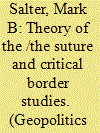

|
|
|
|
|
| Publication |
2012.
|
| Summary/Abstract |
Borders are crucial sites of political and spatial contestation: and in an attempt to evade the lamentation for an ideal model of a single line or the empty insistence of the dominance of that line, this article argues that the trope of the suture better captures the dual world-creating functions of the border. By examining the critical border theories of Agamben, Walker, and Galli, the suture better focuses analytical attention towards the role of borders in the creation of both sovereign states and the system of sovereign states.
|
|
|
|
|
|
|
|
|
|
|
|
|
|
|
|
| 10 |
ID:
117442
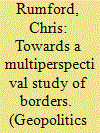

|
|
|
|
|
| Publication |
2012.
|
| Summary/Abstract |
The paper develops a non-state centric approach to the study of borders, building upon Balibar's 'borders are everywhere' thesis. It offers a critique of the assumption of consensus (mutual recognition of borders) in border studies. It is argued that borders do not have to be visible to all in order to be effective. The case for a multiperspectival border studies is then outlined: borders cannot be properly understood from a single privileged vantage point and bordering processes can be interpreted differently from different perspectives. A key dimension of a multiperspectival approach to border studies is examined in detail: borderwork, societal bordering activity undertaken by citizens. This is explored at several UK sites in order to demonstrate the ways in which borders are not always the project of the state, that they can exist for some (but not all), and can link people to the world beyond the 'local' border.
|
|
|
|
|
|
|
|
|
|
|
|
|
|
|
|
| 11 |
ID:
117444


|
|
|
|
|
| Publication |
2012.
|
| Summary/Abstract |
What makes citizens choose a particular mode of protest? This paper discusses the role of space in recent protests by three Israeli groups, Machsom Watch, Anarchists Against the Wall, and Women in Black, in Israel/Palestine. It looks at the way groups protest state violence (i.e., the occupation of the West Bank and Gaza and the construction of the separation wall) by initiating counter hegemonic strategies and tactics, and by creating new terrains of opposition. More specifically, I elaborate on their model of action and its function within a range of spheres (physical, geographical and virtual), supported by four key principles (difference, decentralisation, multiplicity and informal order). I argue that unlike more conventional protest rituals, often led by the dominant political parties, contemporary dissent takes place in parallel spheres constructing what I call transformative terrain - a social platform that challenges bounded politics by using imagination and space in creating new possibilities.
|
|
|
|
|
|
|
|
|
|
|
|
|
|
|
|
|
|
|
|
|